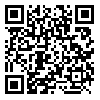مجله رویش روانشناسی از دادن گواهیهای کاغذی معذور است. لطفا تقاضا نکنید. همه گواهی ها در صفحه شخصی کاربران موجود است.
year 14, Issue 7 (Autumn1 2025 2025)
Rooyesh 2025, 14(7): 185-192 |
Back to browse issues page
Download citation:
BibTeX | RIS | EndNote | Medlars | ProCite | Reference Manager | RefWorks
Send citation to:



BibTeX | RIS | EndNote | Medlars | ProCite | Reference Manager | RefWorks
Send citation to:
Farsi F, Kiani Q, Hoseini Almadani S A. (2025). Prediction of Eating Behavior Based on Ego Strength and Emotional Invalidation in Obese Women with Diabetes. Rooyesh. 14(7), 185-192.
URL: http://frooyesh.ir/article-1-6233-en.html
URL: http://frooyesh.ir/article-1-6233-en.html
1- Department of Psychology, North Tehran Branch, Islamic Azad University, Tehran, Iran.
2- Department of Psychology, Zanjan Branch, Islamic Azad University, Zanjan, Iran. ,Qa.kiani@iau.ac.ir
2- Department of Psychology, Zanjan Branch, Islamic Azad University, Zanjan, Iran. ,
Abstract: (568 Views)
The present study aimed to predict eating behavior based on ego strength and emotional invalidation in obese women with diabetes. The research design was descriptive-correlational. The statistical population included obese women with diabetes who attended diabetes treatment centers affiliated with Shahid Beheshti University of Medical Sciences in 2024, with a reported number of 200,000 according to the medical centers' statistics. From this population, 384 women were selected as a sample through convenience sampling. The research instruments included the Dutch Eating Behavior Questionnaire (DEBQ; Van Strien, 1986), the Ego Strength Scale (SES; Markstrom et al., 1997), and the Perceived Invalidation of Emotional Scale (PIES; Zelenski, 2016). The data analysis method was simultaneous regression analysis. Results showed that ego strength and emotional invalidation together explained 17.9% of eating behavior variance (P<0.05). It was concluded that ego strength facilitates healthier eating behaviors, while emotional invalidation was associated with an increase in emotional and unhealthy eating behaviors.
Type of Article: Research |
Subject:
Health
Received: 2025/04/29 | Accepted: 2025/05/6 | ePublished: 2025/10/2
Received: 2025/04/29 | Accepted: 2025/05/6 | ePublished: 2025/10/2
Send email to the article author
| Rights and permissions | |
 |
This work is licensed under a Creative Commons Attribution-NonCommercial 4.0 International License. |





